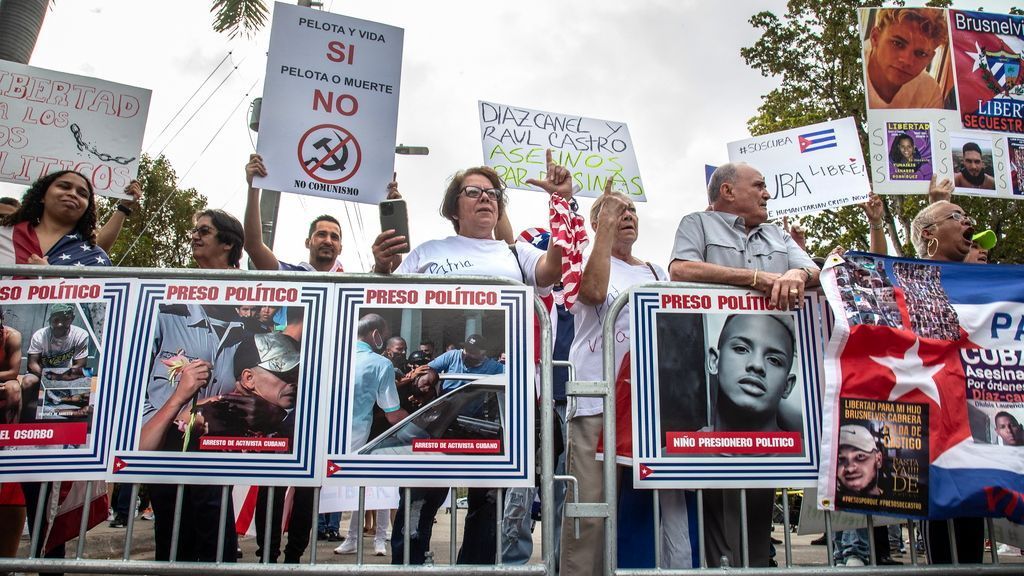MIAMI — Cuban jerseys, caps and flags decorated the concourse directly outside of loanDepot Park on Sunday afternoon, moments before Team Cuba would begin its World Baseball Classic semifinal game against the United States.
That was within the gates. Directly outside of them, dozens of protesters gathered in front of about 15 police officers with signs speaking out against Cuba’s communist government and the political prisoners still detained on the island.
“Libertad!” one man constantly shouted.
“Freedom for Cuba!” another woman hollered from time to time.
Sunday marked the first time since at least the beginning of Fidel Castro’s reign more than 60 years ago that Cuba’s national baseball team visited Miami, specifically Little Havana, the Cuban enclave that houses so many of the people who have fled the island dating back to the 1960s. Some have been able to separate its baseball from its politics, while many others can’t, a singular dynamic that, for one night, was encapsulated within one baseball stadium.
It extended beyond the fans.
“To be quite honest with you, there’s a lot of anxious feelings,” said Team USA third baseman Nolan Arenado, the son of Cuban immigrants, adding that he had a long chat about Cuba’s presence with his family earlier in the morning.
“You know, if it wasn’t for the sacrifices my grandparents made to get here for my parents, I don’t know if I would have been the player that I am today, so, there’s a lot of feelings I feel toward it. I respect them, I respect the players, but we have a job to do.”
Cheers and a faint “Cuba!” chant were heard when the Cuban flag was unfurled during pregame introductions, but Yoan Moncada and Luis Robert Jr. of the Chicago White Sox — the first two active major leaguers to ever play for a Cuban national team, a concession made between the Cuban and U.S. governments for this year’s World Baseball Classic — were roundly booed.
Moncada and Robert represent two of the biggest Cuban-born stars in the major leagues, but many others were either not invited by the Cuban Baseball Federation or not interested. In many cases, both applied. The list of absentees included Jose Abreu, Yordan Alvarez, Aroldis Chapman, Yasmani Grandal, Yandy Diaz and, most notably, Randy Arozarena, who is instead starring for Mexico, the country he arrived in after fleeing Cuba in 2015.
Arozarena, who has been adamant about not representing his birth place, said earlier Monday that he would attend the game and cheer for Cuba — but for different reasons.
“I want to face Cuba in the final,” Arozarena said in Spanish, “and hopefully we beat them.”
Six police officers made up the foul-territory warning track moments before Adam Wainwright threw the ceremonial first pitch, double the typical presence in this tournament. A heavier police presence was expected for Monday’s game. Ballpark security officials, meanwhile, were told to be diligent identifying signs that violated the stadium’s code of conduct, which includes restrictions on language “regarding political affiliation, social and economic matters or other statements that undermine civil liberties.”
Apparel in support of the Cuban baseball team was prominent throughout the ballpark, but many fans also entered wearing T-shirts that read “Patria y Vida,” an homage to the famous anti-communism slogan and song associated with the Cuban protests of 2021. The expression, directly translated to “homeland and life,” is a play on the Cuban motto “Patria o Muerte” (“homeland or death”). One of its biggest supporters is Livan Hernandez, the famous Cuban pitcher who won the World Series with the Miami Marlins in 1997 and threw out Monday’s ceremonial first pitch, alongside former teammate Jeff Conine.
Hernandez’s ties to that movement stand as a reason why he didn’t feel comfortable shaking hands with Cuban manager Armando Johnson, despite their long history. As Cuba’s coach, Johnson is naturally tied to Cuba’s government, given the way culture and politics are naturally entwined on the island.
“I don’t think it’d be appropriate for everybody who’s suffering, or those who were imprisoned for things they shouldn’t be,” Hernandez told ESPN’s Marly Rivera. “Armando Johnson was my coach since I was a kid, but there are things in front of us that we are not in agreement on, and I’m here 150% with ‘Patria y Vida.'”
Hernandez, whose brother, Orlando, also fled Cuba, expected the reaction from the crowd to be “divided.” That was obvious as early as the second inning. A “libertad!” chant broke out, but then loud cheers for the Cuban team were heard after a single by Yadir Drake. Three batters later, when Moncada came to bat again, another “Patria y Vida” chant was heard.
Hours earlier, Arenado was asked how he views the inclusion of major league players on Cuba’s national team.
“I think I’ve heard mixed reviews,” Arenado said. “I asked people about it. I asked Cuban players, former players that are Cuban what their opinion is about it. I’ll probably keep that to myself. But, listen, I think people are proud to represent their country, just like I’m proud to represent USA. And I understand why they want to do it. I think over there there’s a little bit more issues, and I think people have more issues with it. But I don’t think that’s for me to speak on.”
